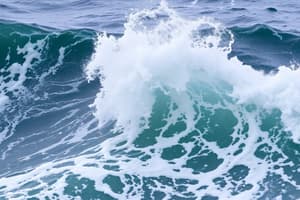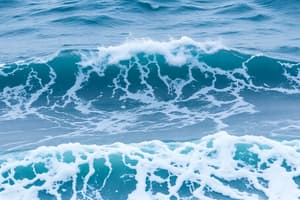Podcast
Questions and Answers
What is the primary cause of ocean waves?
What is the primary cause of ocean waves?
- Earth's gravity
- Wind friction on the surface of the ocean (correct)
- Vibration of the Earth's interior
- Tides and ocean currents
What is the characteristic of sound waves that determines the pitch of the sound?
What is the characteristic of sound waves that determines the pitch of the sound?
- Amplitude
- Speed
- Wavelength
- Frequency (correct)
What is the range of wavelengths for visible light?
What is the range of wavelengths for visible light?
- 400-700 nanometers (correct)
- 1-10 nanometers
- 1-10 micrometers
- 100-1000 nanometers
What is the speed of electromagnetic waves in a vacuum?
What is the speed of electromagnetic waves in a vacuum?
What type of seismic waves can travel through solid, liquid, and gas?
What type of seismic waves can travel through solid, liquid, and gas?
What is the characteristic of ocean waves that determines the distance between two consecutive wave crests?
What is the characteristic of ocean waves that determines the distance between two consecutive wave crests?
What is the primary application of electromagnetic waves?
What is the primary application of electromagnetic waves?
What is the characteristic of sound waves that determines the loudness of the sound?
What is the characteristic of sound waves that determines the loudness of the sound?
What is the characteristic of light waves that determines the intensity of the light?
What is the characteristic of light waves that determines the intensity of the light?
What type of seismic waves can travel through solid media only?
What type of seismic waves can travel through solid media only?
Flashcards are hidden until you start studying
Study Notes
Waves
Ocean Waves
- Caused by wind friction on the surface of the ocean
- Transfer energy from one location to another
- Characteristics:
- Wavelength: distance between two consecutive wave crests
- Frequency: number of waves passing a point per second
- Amplitude: maximum height of the wave above the calm water level
- Speed: depends on wavelength and water depth
Sound Waves
- Mechanical waves that propagate through a medium (solid, liquid, or gas)
- Produced by vibration of an object
- Characteristics:
- Frequency: pitch of the sound
- Wavelength: distance between two consecutive compressions or rarefactions
- Amplitude: loudness of the sound
- Speed: approximately 343 m/s in air at room temperature and atmospheric pressure
Light Waves
- Electromagnetic waves that transmit energy through electromagnetic fields
- Produced by vibration of charged particles
- Characteristics:
- Wavelength: varies from 400-700 nanometers (visible light)
- Frequency: related to energy and color
- Amplitude: intensity of the light
- Speed: approximately 299,792,458 m/s in a vacuum
Electromagnetic Waves
- Waves that propagate through electromagnetic fields
- Produced by acceleration of charged particles
- Characteristics:
- Wavelength: ranges from gamma rays (<0.1 nm) to radio waves (>1 m)
- Frequency: related to energy and wavelength
- Amplitude: intensity of the radiation
- Speed: approximately 299,792,458 m/s in a vacuum
- Applications: radio communication, medical imaging, heating, and lighting
Seismic Waves
- Mechanical waves caused by the vibration of the Earth's interior
- Produced by earthquakes, volcanic eruptions, or human activities
- Characteristics:
- P-waves (primary waves): compressional waves that travel through solid, liquid, and gas
- S-waves (shear waves): shear waves that travel through solid media only
- Surface waves: waves that travel along the Earth's surface
- Speed: varies depending on the type of wave and the medium
Waves
Ocean Waves
- Caused by wind friction on the ocean surface
- Transfer energy from one location to another
- Characterized by wavelength, frequency, amplitude, and speed
- Speed depends on wavelength and water depth
Sound Waves
- Mechanical waves that propagate through solid, liquid, or gas
- Produced by object vibration
- Characteristics: frequency (pitch), wavelength, amplitude (loudness), and speed (343 m/s in air)
- Speed approximate in air at room temperature and atmospheric pressure
Light Waves
- Electromagnetic waves transmitting energy through fields
- Produced by charged particle vibration
- Characteristics: wavelength (400-700 nm), frequency (related to energy and color), amplitude (intensity), and speed (approximately 299,792,458 m/s in a vacuum)
Electromagnetic Waves
- Waves propagating through electromagnetic fields
- Produced by charged particle acceleration
- Characteristics: wavelength (gamma rays to radio waves), frequency (related to energy), amplitude (intensity), and speed (approximately 299,792,458 m/s in a vacuum)
- Applications: radio communication, medical imaging, heating, and lighting
Seismic Waves
- Mechanical waves caused by Earth's interior vibration
- Produced by earthquakes, volcanic eruptions, or human activities
- Characteristics:
- P-waves: compressional waves through solid, liquid, and gas
- S-waves: shear waves through solid media only
- Surface waves: along the Earth's surface
- Speed varies depending on wave type and medium
Studying That Suits You
Use AI to generate personalized quizzes and flashcards to suit your learning preferences.




